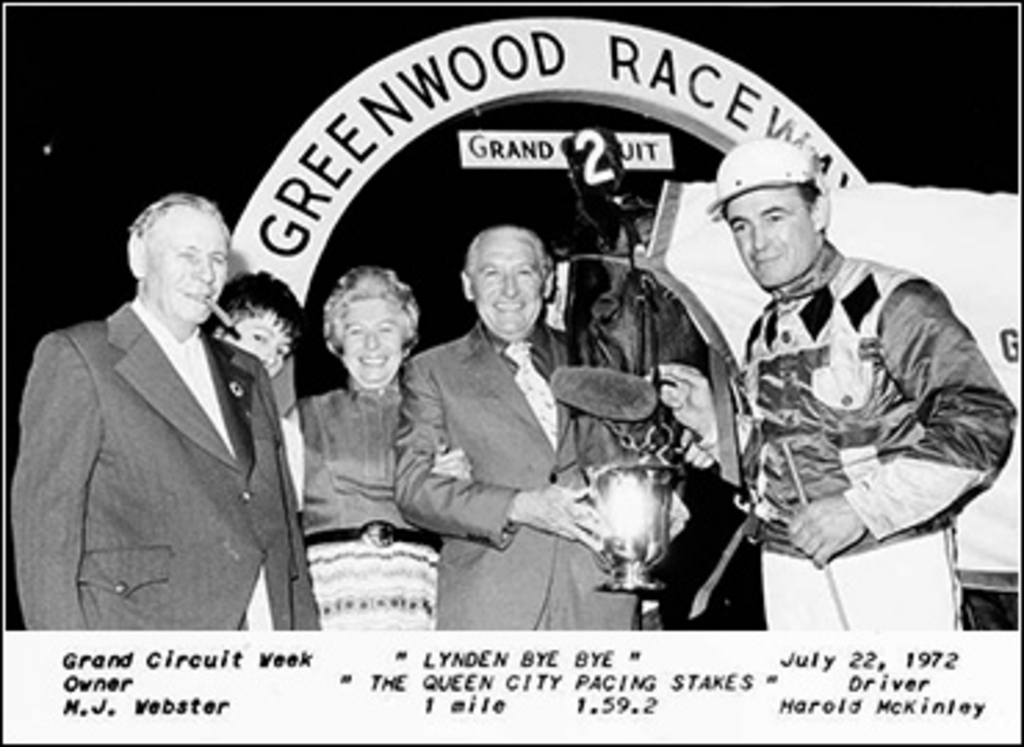
 In this week's Rewind, Robert Smith recalls the once famous Queen City Pace, the predecessor to the Pepsi North America Cup, and reviews the first ten years of this classic event.
In this week's Rewind, Robert Smith recalls the once famous Queen City Pace, the predecessor to the Pepsi North America Cup, and reviews the first ten years of this classic event.
Tonight's Pepsi North America Cup has slowly risen to unprecedented heights as the sport's premiere event in Canada. Much like Rome though, "It was not built in a day." The modern day version of this race now traces its origins back some 50 years. The North America Cup, which began in 1984, was preceded by an event known as The Queen City Pace which was first contested in 1964, thus the half-century of growth and history.
The first ever Queen City Pace, a race exclusively for three-year-old pacers was first staged on Saturday, August 24, 1964 at Greenwood Raceway. A horse from Quebec City named Timely Knight, who came into the race undefeated after his first 12 starts, was the race's first ever winner with Eagle Armbro second. The purse for that inaugural event was $9,750, considered a sizable sum in those days. By way of comparison, that year's three-year-old pacing Futurity carried a purse of just $4,050 and was captured by Rocky Herbert driven by his co owner Jack Herbert . As a matter of interest "Rocky" (who was well named) did not start in the first Queen City event despite having a banner year, winning 14 of 21 starts.
In the inaugural event, a field of eight started on what was a great evening as planned but a horrible weather night. As many remember Greenwood could really be "sloppy" and so it was that night. Unlike the current version, three fillies were in the original field and in fact the third place finisher was Highland Girl in rein to Hughie McLean. The Greenwood track was so slow that night that the time for this event was 2:28.2 for the distance of 1-1/8 miles. As an indicator of the "slowness" of the racing surface, the contests being raced at the standard one mile distance were in the neighbourhood of 2:16 for most of the card. The evening's fastest mile time was 2:14.4 turned in by Armbro Electra handled by Harold McKinley.
The race had some outstanding colts who had very successful three-year-old seasons in an era when the earnings potential for young horses racing in Canada was fairly low. The introduction of The Queen City Pace was an indication of the need for races with higher purses in Ontario for young horses.
Timely Knight had a tremendous three-year-old campaign, winning all but three of his 16 season's starts, finishing twice second. He took a record of 2:01.3 on the Monticello half-mile track in just his fifth start as a three-year-old and earned $46,526 for his season's work. After starting the year out at Monticello, most of his summer's racing was at either Blue Bonnets or Richelieu Park. Colt racing in Quebec in those days was fairly well-advanced and provided more lucrative purses than elsewhere in Canada.
Another Quebec-based colt named Senator Burton was expected to do well in this event but despite his earlier successes finished a disappointing 7th. This colt was the second biggest money earner in the field by the year's end, winning just five races but nearly $36,000. Trained and driven by a then-24-year-old Herve Filion, Senator Burton was the only Queen City entrant to race in the ultimate three-year-old test later that year, The Little Brown Jug. They finished a very respectable third in an elimination heat and ninth in the Jug final. This son of Adios Senator was owned by Roland Lariviere & Son of Hull Sud, Quebec.
From the standpoint of excitement and perhaps even drama, the 1972 edition won by Lynden Bye Bye would have to take top billing. With a field that included two almost unbeatable colts -- Strike Out and Silent Majority -- Lynden Bye Bye triumphed over his nine rivals and also survived a claim of "foul" lodged by Yves Filion, driver of Bob Hilton. After a 15 minute delay while the judges reviewed film of the race, the Max Webster-owned horse was given the victory; his second in the nine-year existence of the race. A unbelievable payout of $151.30 for a two-dollar wager thrilled a precious few in the large audience.
By the end of the first 10 years of its existence, the Queen City Pace increased in stature and popularity each year. The purse nearly tripled by the 7th year. A look at the list of winners shows an impressive collection of very talented performers, indeed the best the sport had to offer each season.
List of Queen City Pace Winners: The First Ten Years - 1964-1973
(year - winner - driver - time - purse)
1964 - Timely Knight (Roger White) -- 2:28.2 * -- $9,750
1965 - Jerry Hal (Wally McIllmurray) -- 2:29 ** -- $9,550
1966 - H.A. Meadowland (Ron Feagan) -- 2:00.4 -- $8,950
1967 - Lynden Dodger (Bob Silliphant) -- 2:01.1 -- $13,225
1968 - Rum Customer (Alix Winger) -- 2:01 -- $19,700
1969 - Super Wave (Jack Kopas) -- 2:03.1 -- $17,700
1970 - Columbia George (R. Beaulieu) -- 1:57.4 *** -- $27,100
1971 - Albatross (Stanley Dancer) -- 2:00.4 -- $24,800
1972 - Lynden Bye Bye (Harold McKinley) -- 1:59.2 -- $26,500
1973 - Melvins Woe (Joe O'Brien) -- 1:59.2 -- $25,600
* - Race contested at 1-1/8 miles
** - Race contested at 1-3/16 miles
*** - New track record and three-year-old track record
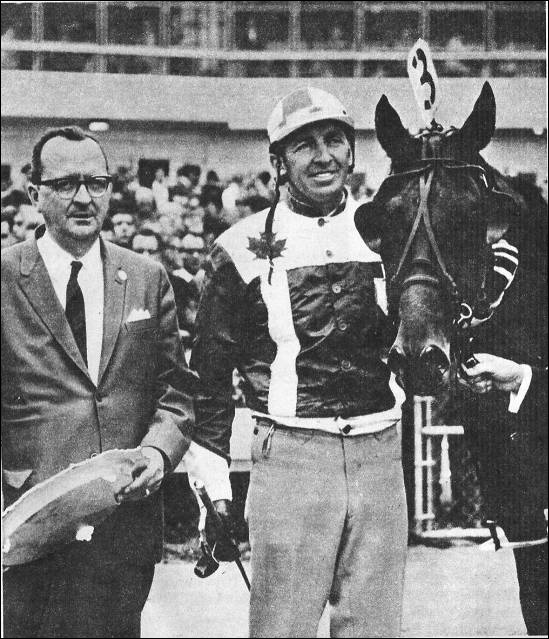
1964 - Inaugural winner Timely Knight is shown with owner Allen Leblanc of Quebec City and driver Roger White. This was the horse's 13th straight victory in as many starts that season
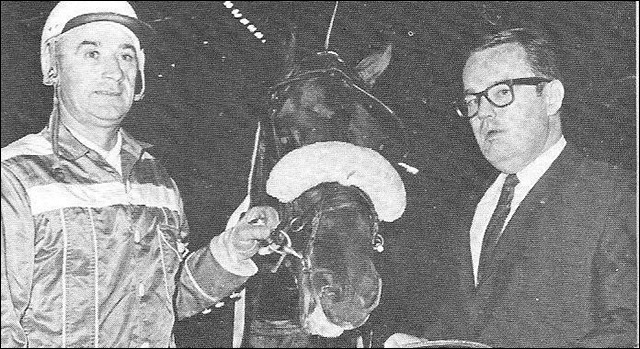
In 1968 Rum Customer became the first U.S. owned horse to win The Queen City. Appearing in the winners circle are driver Alix "Spider" Winger a Canadian born horseman who starred in the U.S.. Making the presentation is Jim Proudfoot of The Toronto Star
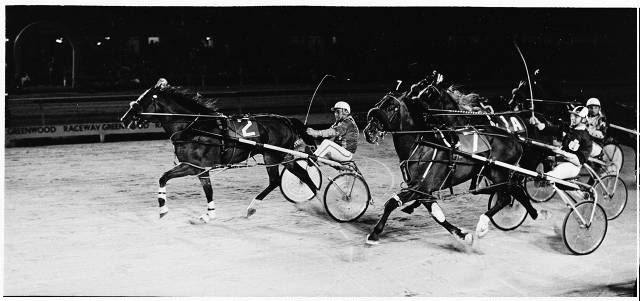
Lynden Bye Bye (2) closes quickly to capture the 1972 Queen City Pace at Greenwood Raceway. Finishing second is Hilarious Way(7) (J. Simpson Jr.) and third is Silent Majority (Vernon Dancer)
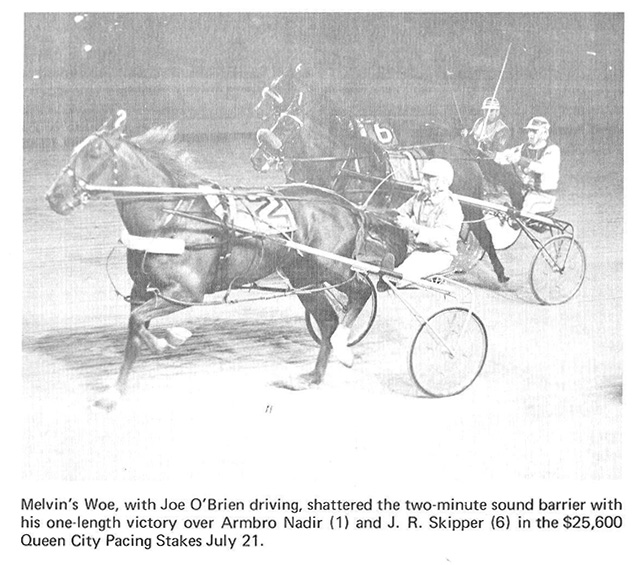
Melvins Woe reaches the finish wire a winner by a length over Armbro Nadir (Nelson White) and third place finisher J R Skipper (Ron Waples) in the 1973 race. The purse of this event was $25,600.


Great job Robert. Keep up
Great job Robert.
Keep up the good work. We love it.